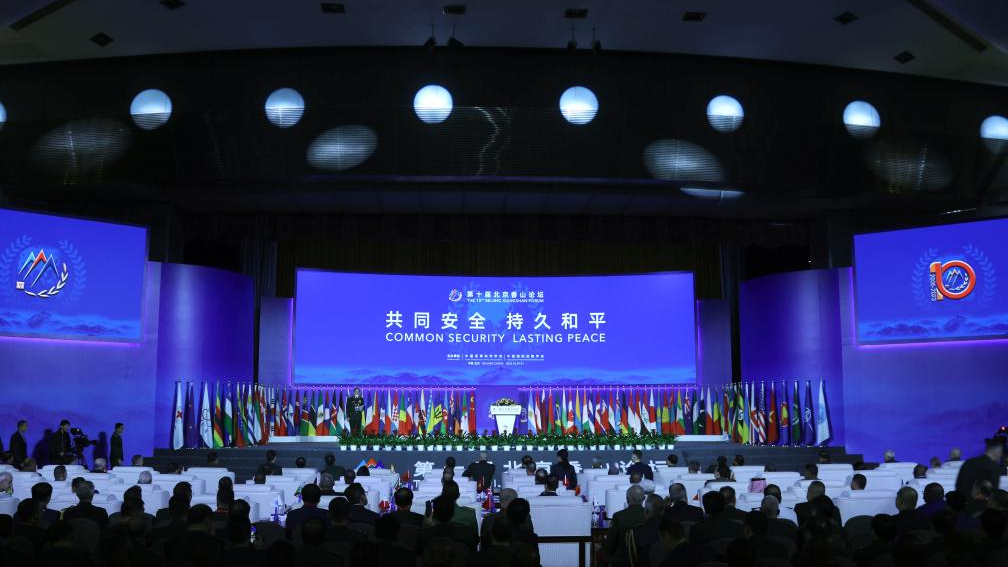
The opening ceremony of the 10th Beijing Xiangshan Forum in Beijing, capital of China, October 30, 2023. [Photo/Xinhua]
By Sumaya Chowdhury
China is hosting the Beijing Xiangshan Forum – the country's biggest annual military diplomacy event that is a "Track 1.5" discussion platform to include both high-ranking government officials and esteemed academics from all around the world.
This year's Xiangshan Forum, which was first launched in 2006 as a biennial gathering before becoming an annual event in 2015, is set to discuss a wide range of issues, including security cooperation, the role of developing countries in global security, and the direction and goals for regional security and development.
With security officials from 90 countries and international bodies, including 22 defense ministers attending, the three-day security conference has been the first in-person edition in four years, as the last such forum was held in 2019 before being either canceled or held virtually owing to the pandemic.
There are several reasons why this year's forum is so important. It was no small feat for China to host this conference when the mainstream international media, predominantly influenced by the Western foreign and military agenda, are not necessarily friendly towards Beijing – most often not. Western nations and media have made it nearly second nature to smear out something negative to say about everything with Chinese or Chinese origins. The Beijing Xiangshan Forum is no exception to this annoying pattern.
Mainstream Western media, for instance, often characterize the Xiangshan Forum as a Chinese equivalent of the Shangri-La Dialogue, Asia's top security forum. In a dubious attempt to undercut its substance and portray it as an inconsequential security gathering in comparison to the latter one, Western media have been seen pointing to the flimsy and low-ranking presence of the Western delegations in this forum.
Moreover, they seem to obliquely suggest the comparatively vast representations of the poor and developing countries at the conference as a point of frailty, as many of the delegates at the forum represent developing countries, collectively referred to as the Global South.
Nonetheless, what the Western media count as a point of deficiency is exactly the forum's strongest point of distinction, serving it to stand out from the rest. The well-established West-dominated security conferences, such as the Shangri-La-Dialogue in Singapore, seem to have devolved into a "speak ill" platform, with little to no impact on the larger regional or global security landscape in the direction of constructive and peaceful developments.
Additionally, overshadowed by the prevalence of issues related to powerful stakeholders, developing countries' issues of concern are often ignored, and their voices are seldom heard. By this measure, the Xiangshan Forum, in contrast, is a strong and inclusive platform, exemplifying the virtue of multilateralism while providing representative values to the nations in the Global South, who are often marginalized in Western-dominated forums.
For example, representatives from Armenia and Azerbaijan are among the attendees at the Beijing Xiangshan Forum. Recently, the two countries have engaged in another round of military conflicts over the disputed Nagorno-Karabakh region. However, they have agreed to pursue peace talks under the mediation efforts of neighboring Russia, Türkiye and Iran.
While effective, practical, and lasting solutions to their decades-old territorial dispute and ethnic conflict have remained elusive to date, it could reasonably provide the two southern Caucasus countries with opportunities to discuss their disputes head-on and potentially meet halfway as the forum has brought both of the disputing parties under the same roof at the Xiangshan forum.
The arrival of Armenian and Azerbaijani delegations demonstrates that the Global South is looking to China for regional security solutions, testifying to China's preeminent position on the global stage as a voice for the Global South. It also indicates a growing shift away from the traditional focus on the West when it comes to the settlement of security concerns.
Therefore, the 10th Beijing Xiangshan Forum "serves as a platform for the rising China to raise its voice, allowing the outside world to understand its global strategic direction and its strategic mentality." And China's peaceful rise is good enough to brush away unfounded Western accusations of the Chinese military being "coercive" or "assertive."
At the same time, with a well-calibrated theme of "Common Security, Lasting Peace," this year's forum invokes an egalitarian and comprehensive sense of global security accomplished through delivering on common aspirations, ensuring common prosperity, and addressing common concerns.
Sumaya Chowdhury, a special commentator on current affairs for CGTN, is an independent columnist and freelance journalist based in Dhaka, Bangladesh.

 中文
中文



